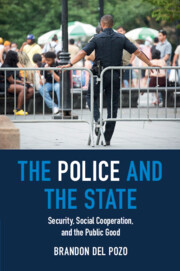Book contents
- The Police and the State
- The Police and the State
- Copyright page
- Contents
- Introduction
- Chapter 1 The Role of the Police
- Chapter 2 The First Power of the Police
- Chapter 3 The Second Power of the Police
- Chapter 4 The Third Power of the Police
- Chapter 5 Democratic Priorities, Relationships, and Tensions
- Chapter 6 The Bases of, and Reasons for Seeking, Police Legitimacy
- Chapter 7 Procedural Justice in Policing Revisited
- Chapter 8 Policing with Public Reason
- Chapter 9 Policing Populism, Protecting Pluralism
- Chapter 10 Primary Goods, Policing States in Transition, and Natural Experiments
- References
- Index
Chapter 9 - Policing Populism, Protecting Pluralism
Published online by Cambridge University Press: 17 January 2023
- The Police and the State
- The Police and the State
- Copyright page
- Contents
- Introduction
- Chapter 1 The Role of the Police
- Chapter 2 The First Power of the Police
- Chapter 3 The Second Power of the Police
- Chapter 4 The Third Power of the Police
- Chapter 5 Democratic Priorities, Relationships, and Tensions
- Chapter 6 The Bases of, and Reasons for Seeking, Police Legitimacy
- Chapter 7 Procedural Justice in Policing Revisited
- Chapter 8 Policing with Public Reason
- Chapter 9 Policing Populism, Protecting Pluralism
- Chapter 10 Primary Goods, Policing States in Transition, and Natural Experiments
- References
- Index
Summary
Several concerns stand to lead policing away from its mandate to protect the full range of citizens in a pluralist democracy. Among them are special interests, coarse majoritarian rule, and populism. Given that policing involves the discretionary allocation of power and resources in a strategic sense, and that the enforcement of a wide range of laws is subject to police discretion in individual encounters, each of these concerns can turn policing toward illiberal ends when they exert undue influence. In this sense, the discretionary nature of police power is most typically turned toward injustice in the pursuit of sectarian or populist goals that may have a veneer of democratic process, but are insufficient to justify the ensuing disparities of privilege, protection, or access to public space. The duty of the police to resist this impulse and only act upon reasons that treat citizens as substantive equals (i.e., by employing Rawlsian public reason) is a critical way to mitigate this hazard. The chapter closes by recounting the failed but valiant struggle of police to prevent populist rioters from seizing the US Capitol on January 6, 2021 as an example of the duty of the police to safeguard democracy from virulent populist interests.
Keywords
- Type
- Chapter
- Information
- The Police and the StateSecurity, Social Cooperation, and the Public Good, pp. 192 - 202Publisher: Cambridge University PressPrint publication year: 2022

